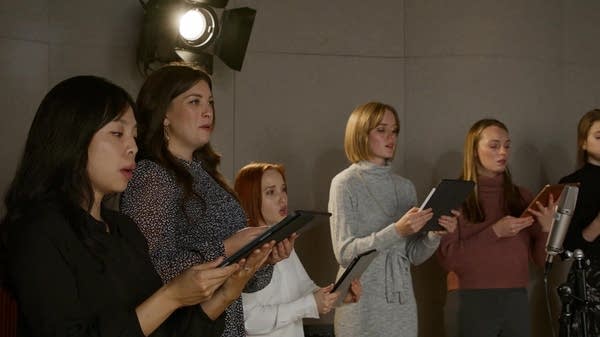Performances of Verdi's Requiem are just around the corner for the Wayzata Symphony Orchestra, the community orchestra in which I play viola. How have our final rehearsals been going with the Two Rivers Chorale, the Edina Chorale, and our soloists?
Well, last week during rehearsal, I left my designated spot in the center of the orchestra to wind my way through and around the performers and snap a few photos. The Requiem as I heard it was indescribable. The words powerful, majestic, and gorgeous are understatements. When I am playing, I cannot afford to cry, pray, tear up, or do a happy dance. As a listener, however, one can be moved to do any of these things, and I certainly was. Spectacular.
The chorus begins by beseeching God in a stirring, heaven-like prayer: "Grant them eternal rest, O Lord." The orchestra provides the up-in-the-clouds ambiance while the singers surround us with the voices of 150 angels. If people come just to hear this first reverential prayer and leave, it would be worth the trip. Then the voices soar and roar in unison with proclamations of "Deliver me, O Lord!" This is powerful! How can there possibly be enough oxygen in the room for all these singers?
Verdi's masterpiece has some of the loudest music ever written. The brass section alone gets plenty loud, as I wrote last week — and then there's the bass drum, timpani, full orchestra, and over 150 voices. Conversely, I suspect that the quiet whispers of "Death will be stupefied," by the bass soloist with the orchestra, are some of the quietest strains in musical history. The breadth and scope of this work are indeed well expressed by this ensemble. For me, it is a profound privilege to play in the Wayzata Symphony Orchestra.
What goes through the minds of orchestra musicians just as a concert is about to begin?
Before heading onto the stage, I have a 12-point "pre-flight checklist": mirror check, clothes, glasses, instrument, shoulder pad, bow, rosin, four strings in tune, music. Next, I have to time my entrance on stage so I am not late but not the first person, either. Under the lights and sitting on my chair I warm up my fingers, my ears, and also let the wood of my instrument adjust to the heat of the lights. There is a fabulous cacophony as everyone plays and chats. I notice who is and who is not in the audience. I smile, I wave. How's the lighting? How are my shoulders? My posture? Will my fingers be relaxed enough to move quickly? Remember to feel the beat, and don't drag, I tell myself.
Something unique happens just before the concertmaster comes on stage. One minute before concert time, everyone who's been warming up madly and doing those last-minute cramming-for-final-exam types of practicing suddenly quiets down. It's like a wave of calmness. We are ready. But an awkward silence won't do, so gentle playing continues, this time with a watchful eye as to what will happen next.
Then everything changes as our concertmaster steps on stage to audience applause. It's like someone took an Etch-A-Sketch and shook it upside down to clear the image. We put our instruments down, and at the direction of the concertmaster, the oboe pierces the silence with a high A note. As we tune our instruments to the pitch given, I begin to feel the thrill of the excellent vibrations we are about to make. I check my music and check how my stand partner is doing. We are both sitting with a relaxed but fully-present focus. It is a state of readiness, a state of listening and watchfulness. Our hearts are open to what is about to happen and every muscle prepares for action.
Finally, our conductor, Marlene Pauley, comes on stage, and the crowd goes wild! Ah! Glorious! Then, in just the time of a heartbeat, there is only the music. We await the downbeat of her baton, which must be both watched and felt. There's a certain way the front row players move their heads and instruments just before we play, then we all sort of breathe together: we have just now, in that exact moment, become one instrument.
Let the music begin.
We'll be performing the Verdi Requiem on Feb. 22 at Orchestra Hall in Minneapolis, and on March 1 at the Wayzata Community Church. For details about these free concerts (no tickets required, donations gratefully accepted) see thewso.org.
Dawn Anderson, MD, is a pediatrician, photographer-videographer, board member, and violist with the Wayzata Symphony Orchestra. She's sharing her story on Classical MPR's website as the orchestra prepares to perform Verdi's Requiem. Watch for more stories from Dawn in coming weeks.
Interested in writing about classical music for Classical MPR? Have a story about classical music to share? We want to hear from you!
Love the music?
Show your support by making a gift to YourClassical.
Each day, we’re here for you with thoughtful streams that set the tone for your day – not to mention the stories and programs that inspire you to new discovery and help you explore the music you love.
YourClassical is available for free, because we are listener-supported public media. Take a moment to make your gift today.











